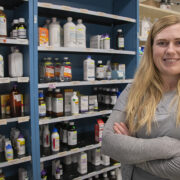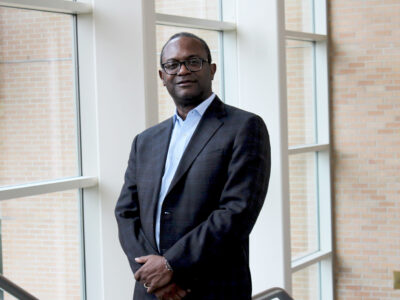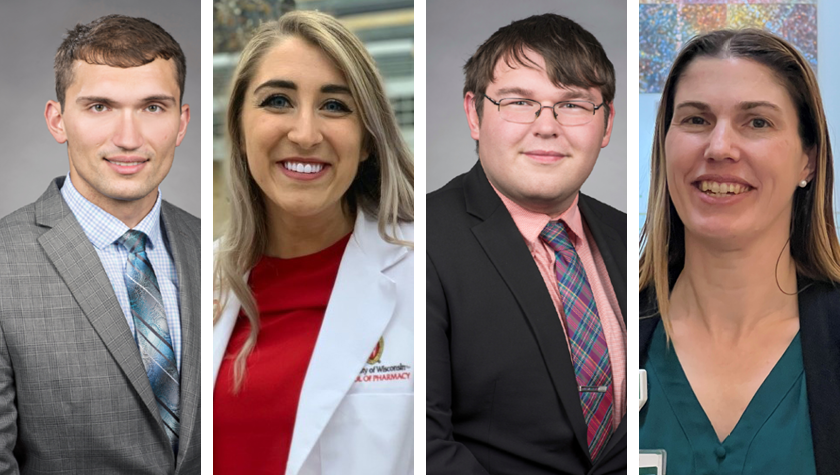
17
March

The first graduating class of the School’s Path of Distinction in Leadership is impacting patient care on multiple levels
By Aarti Gupta
Leadership takes many forms. For pharmacists, leadership skills help them become better patient advocates who ensure that the needs of a diverse group of patients, providers, and caregivers are met. That’s why in the fall of 2017, the University of Wisconsin–Madison School of Pharmacy launched an option in the PharmD program to help future pharmacists develop their leadership skills: the Leadership Certificate and Mentor Program, now known as the Path of Distinction in Leadership.
“Every pharmacist faces situational leadership challenges daily in their practice,” says Associate Professor Karen Kopacek, associate dean for student affairs at the School of Pharmacy. “We must be able to work efficiently, prioritize and delegate, manage conflict, and engage in difficult conversations with others. It is critical that student pharmacists develop these leadership skills to be effective members of interprofessional healthcare teams.”
Since the program’s launch, nearly 90 Badger pharmacists have graduated with the distinction, marking their longitudinal experience with mentorship, leadership development hours, self-reflection, strategic thinking, and other facets of the UW–Madison Leadership Framework that help clinicians become innovators in patient care.
“I was intrigued by the opportunity to develop my own leadership skills and to build up my toolbox to be able to develop leadership in others, which I’ve gotten to do.”
—Andrea Gray
Herolind Jusufi (PharmD ‘20, MS ’22), Andrea Gray (PharmD ‘20), Michael Heltne (PharmD ‘20), and Tara Finucane (PharmD ‘20) were some of the first future pharmacists who jumped at this newly introduced opportunity to combine their interest in pharmacy with a leadership focus. Today, they are applying their leadership acumen at all levels, from direct patient care to management and consulting.
“Leadership is important no matter where you end up, even outside of your professional life,” says Gray. “I was intrigued by the opportunity to develop my own leadership skills and to build up my toolbox to be able to develop leadership in others, which I’ve gotten to do.”
Combining medication safety and leadership
Today, Gray is the pharmacy operations manager in the Oncology and Infusion Center at Dartmouth Hitchcock Medical Center and Clinics in New Hampshire. When she was looking for career opportunities after graduating from the School, she says this position stood out to her because of its impact on medication use and safety.
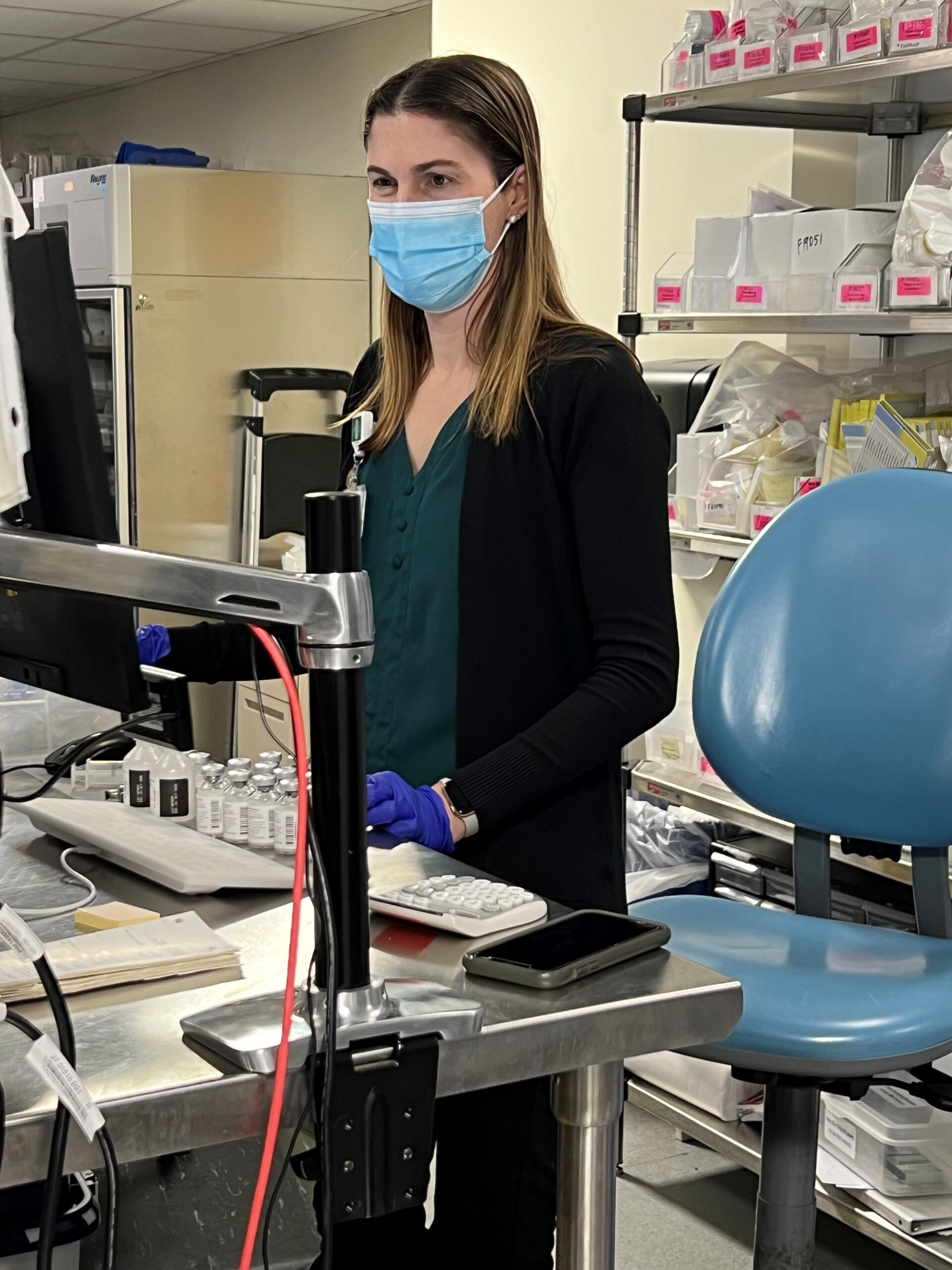
“In my role, I oversee the cancer center’s pharmacy, which produces the center’s chemotherapy. We do both hazardous and nonhazardous sterile compounding, and we provide medications for the infusion clinic,” she says.
She oversees a team of technicians who perform sterile compounding for intravenous medications, as well as medical infusion pharmacists who provide clinical services to the medical infusion unit.
“There are a lot of opportunities for things to go wrong when you’re dealing with chemotherapy and compounding expensive, hazardous medications,” she says. But her experience as a student in the leadership path has given her an advantage.
One of Gray’s most impactful leadership experiences was time she spent as a supply coordinator at the free, student-run MEDiC Clinic, where she worked with other healthcare students and providers to reach underserved populations. Part of the leadership path’s involvement hours, this experience opened Gray’s eyes to the wide-reaching impact she could have as a leader in pharmacy.
“Through the program, I got to see that, as a leader, you can have a bigger impact on entire populations of patients. It also fostered the idea that leadership is a journey — you constantly need to be reflecting and changing, especially in a constantly changing complex healthcare system,” says Gray. “While it’s really rewarding to work with an individual patient and build a connection, I was excited about the opportunity at Dartmouth Hitchcock to have a large-scale impact and build a legacy.”
Service in a pharmaceutical setting
As a consultant specializing in specialty pharmacy at Visante, a clinically focused health system consulting firm based in St. Paul, Minn., Jusufi works to effectively distribute costly therapies to patients in a manner that preserves the integrity of the medications.
Growing up, Jusufi’s family was in the restaurant business, and much of his childhood was spent helping his parents run the restaurant, whether that meant being a dishwasher or taking on managerial duties. When he became a student at the School, he knew he wanted to somehow combine healthcare with the familiar atmosphere of service and leadership, which is what originally led him toward community pharmacy and the School’s leadership path.
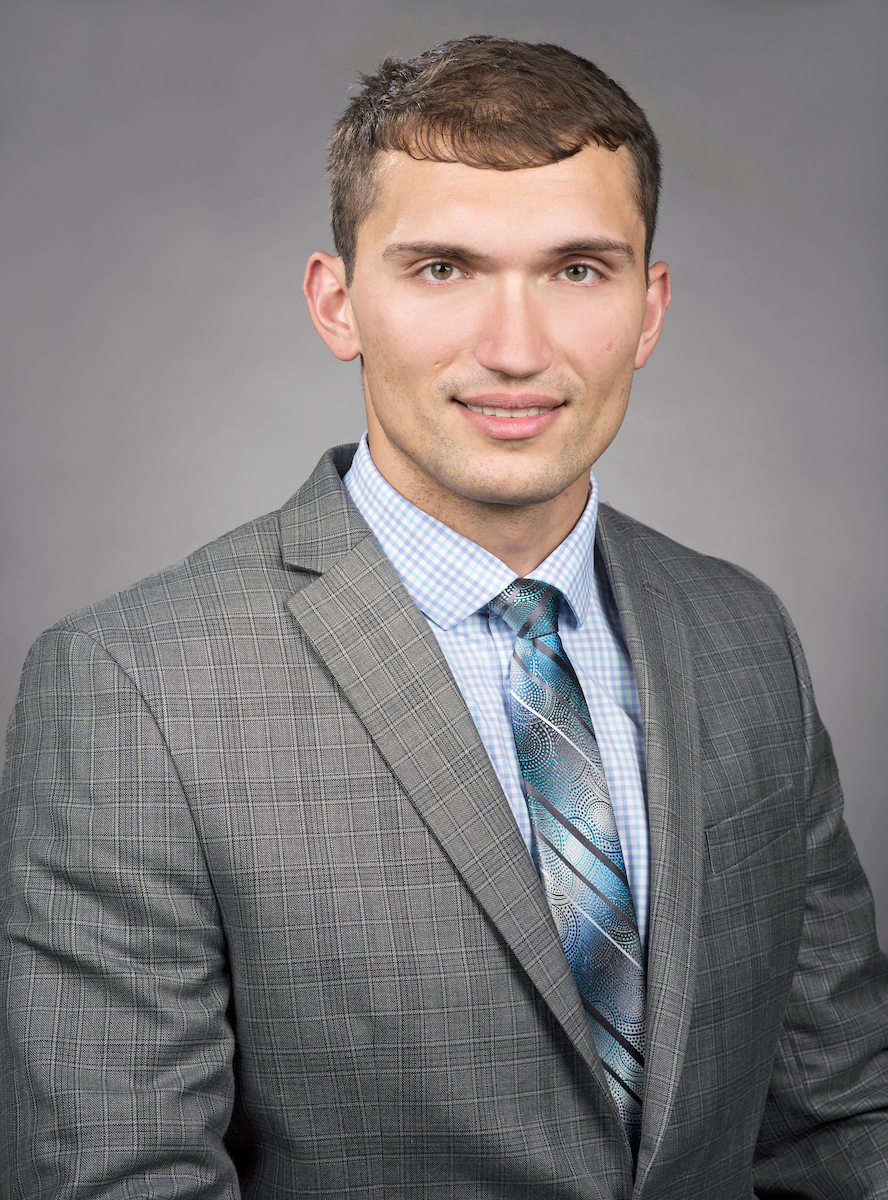
“There were very similar commonalities between food service and pharmacy; they’re both very customer-oriented and customer-facing,” he says. “Instead of serving my customers food, I’d be serving them medications, but then my pharmacy work would obviously have all of the other complexities behind it as well.”
Jusufi’s current position as a consultant allows him to focus on community and outpatient pharmacy — but in a different way than he originally intended.
“I primarily do project management,” Jusufi says. “We help clients start or improve their existing specialty pharmacies. I enjoy it because it involves a lot of hands-on work, where I analyze data, look at business plans, and provide recommendations and strategies to enhance current work in the specialty pharmacy.”
During his time in the leadership program, Jusufi worked closely with his mentor Dan Moore (PharmD ’13), a district manager and now healthcare supervisor at Walgreens, to gain insight into where he should prioritize his time outside of the classroom, such as developing his network, to ascend into leadership positions.
As part of the leadership path, Jusufi also had to complete reflections, which he says were important in helping him understand his current strengths and weaknesses. One of his strengths is bridge-building and collaboration — being able to listen to and connect with others — which Jusufi leverages frequently.
“You’ll have the mindset, curiosity, and toolbox to help solve problems and build whatever you need to.”
—Herolind Jusufi
“I think where the leadership program succeeds is that it gives you the mindset of what it takes to become successful,” he says. “You’ll have the mindset, curiosity, and toolbox to help solve problems and build whatever you need to.”
The intersection of business and pharmacy
In her role as pharmacist-in-charge at Apotheco Pharmacy in Chicago, Finucane’s work has largely combined business management with pharmacy.

In 2020, just after graduating from the School, Finucane joined the Apotheco Pharmacy team and helped open up the Lincoln Park location that she leads — and now, she’s working on launching a second Chicago-area location in Naperville. Finucane is working with the state of Illinois to get licenses, hire and train new staff, and have everything set to open doors for the new pharmacy. Once the new location opens, she will manage both Chicago pharmacies.
When she was interviewing for her role with Apotheco, Finucane’s experiences in the Leadership program gave her something to speak to. She also notes that one of the most influential parts of the leadership program for her was networking and being exposed to many different leaders pursuing various career paths.
“In the program, I was exposed to so many different types of leaders with different skillsets, and some resonated with me more than others,” she says. “I could ask myself why I was so drawn to that person and what I think makes a good leader and what doesn’t, and I could take that and make it my own.”
For Finucane, the combination of business and pharmacy helps her career feel well-rounded and fulfilling.
“I do like being in the store, working with technicians, and even talking to patients,” she says. “That’s why I became a pharmacist to begin with — I didn’t get into pharmacy because I liked business, but I ended up in business because I liked pharmacy.”
Leading at any level
After graduating from the School, Heltne first worked in a community pharmacy for a few months before starting as a clinical pharmacist at Ascension at Home, a home infusion pharmacy. He managed IV medications and had a patient-focused role where he could guide patients through administration and logistics. A short seven months later, he became manager of that pharmacy — a position he drew on his experience in the Leadership Certificate Program to attain.

“The School’s leadership program provides the opportunity to create a mindset that allows you to think about different opportunities and not be afraid to say yes,” says Heltne. “So, when this role opened up, I told my manager that I was interested and had done this leadership program. I knew I was young, but I had experience from the program. It was definitely rewarding.”
Heltne says that his experience in the Path of Distinction in Leadership gave a wide overview of leadership skills, and that he’s been able to apply them to be more successful in his day-to-day work, both formerly as an Ascension at Home pharmacy manager and, as of January 2023, as a hospital pharmacist at Mayo Clinic in Rochester, Minn.
“I apply my leadership skills daily by looking at different situations and being a guide for other people,” says Heltne. “That could be through talking to pharmacists about different ways to approach compounding, solving problems, or even training technicians. I’m always assessing different tasks and figuring out ways to segment them into immediate or long-term priorities.”
He references how the concepts of “Big L” and “Little L” leadership that he learned at the School have been influential. Big L concerns formal titles and positions, whereas Little L involves influencing teams or peers from alongside them.
“Leadership includes how we influence our workplaces and how we think critically about our work and it fits into the bigger picture,” says Heltne. “Anyone can benefit from that mindset.”
Fostering future leaders
These alums are just a select few of the emerging leaders that the School has been able to foster — on average, more than 20 PharmD students graduate with the distinction each year.
Although the program has undergone some changes since it was originally launched, the main goals of the program continue to focus on longitudinal experiences with mentorship, self-reflection, collaboration, civic engagement, and more.
“Completing the leadership path while in pharmacy school allows our students to connect the Leadership Framework with their courses, implement the competencies and values during clerkships and internships, and critically reflect on their professional development,” says Kopacek. “Its positive effect on our students’ impactful careers is already clear.”


